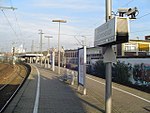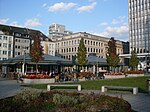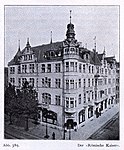The German Diabetes Center (DDZ), Leibniz Center for Diabetes Research at Heinrich Heine University (HHU), is a research institution based in Düsseldorf. In 1964, it was founded due to the initiative of Prof. Dr. med. Karl Oberdisse as an Association for the Promotion of Research on Diabetes mellitus (Gesellschaft zur Förderung der Erforschung der Zuckerkrankheit e.V.). The DDZ performs research on diabetes mellitus in a transdisciplinary approach. The aim is the prevention, early detection, diagnosis and treatment of diabetes and its sequelae. The work focuses on application-oriented research in the fields of clinical diabetology, clinical biochemistry and pathobiochemistry, biometrics and epidemiology, vascular and islet cell biology as well as health services research and health economics. The investigation of risk genes, mechanisms, individual lifestyles in combination with environmental influences and their long-term effects on the population and their supply play a decisive role. DDZ has also performed clinical studies and established several cohorts, such as the German Diabetes Study (GDS), which examines the course of diabetes as well as its sequelae. Since 2008, Michael Roden is the chief scientific officer and spokesman of the board of the DDZ as well as the director of the Institute for Clinical Diabetology. Additionally, he serves as the chief physician of the Division of Endocrinology and Diabetology at the University Hospital Düsseldorf.The research center is under the legal body of Association of the German Diabetes Research Association (Deutsche Diabetes-Forschungsgesellschaft e.V.) as well as an affiliated institute of the HHU. As a "Leibniz Center for Diabetes Research", it is a member of the scientific community Gottfried Wilhelm Leibniz.
The DDZ has around 240 employees and works closely with the Division for Endocrinology and Diabetology of the University Hospital Düsseldorf, the Institute for Metabolic Physiology and the Institute for Health Services Research and Health Economics at HHU. The DDZ is also a founding partner in the German Center for Diabetes Research (DZD e.V.).The DDZ runs numerous clinical studies. The multicenter German Diabetes Study (GDS), which is carried out together with the partners and associated partners of the DZD eV, examines the metabolic changes of currently 1,500 people with diabetes mellitus within the first year after diagnosis and observes the course of comorbidities and late effects for at least ten years. Together with the Leibniz Institute for Environmental Medical Research (IUF) Düsseldorf, the DDZ runs a study center of the German National Cohort (NAKO Gesundheitsstudie), which examines 10,000 of 200,000 people in Germany to enable improved prevention, early detection and diagnosis of common diseases such as cancer, diabetes and dementia. The DDZ is also conducting a study on metabolic changes after bariatric surgery in obese people (BARIA-DDZ). Since 1989, the DDZ has used a population-based diabetes incidence register to understand better the frequency of diabetes in childhood, adolescence and young adulthood. Additionally, it partakes in the Europe-wide cooperation project EURODIAB ACE to contribute to the epidemiology of type 1 diabetes.
Half of the finances from DDZ is funded by the Federal Ministry of Health (BMG) and the North Rhine-Westphalian Ministry of Culture and Science (MKW NRW) each. In addition, projects are funded by the European Union (EU), the German Research Foundation (DFG) and the Federal Ministry of Education and Research (BMBF).









